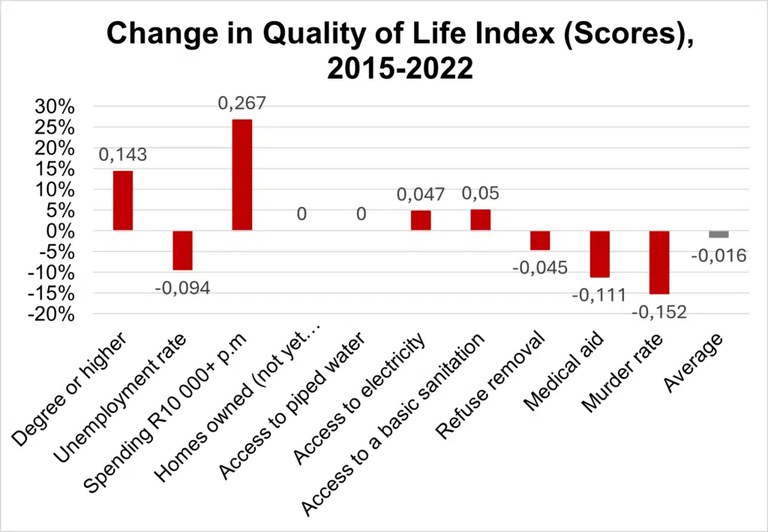![[Opinion] Quality over quantity [Opinion] Quality over quantity](https://cra-sa.com/media/opinion-quality-over-quantity/@@images/a3049844-b7a0-40f9-b807-153772839a1d.jpeg)
Even though South Africa’s socio-economic challenges have increased each year since 2008, there are various reasons and motivations on the part of voters to continue voting for the African National Congress (ANC).
The ANC’s grip on power may be partly attributable to its early success in rolling out basic services to millions of people who were deprived of clean water, electricity, good schools, and healthcare facilities during Apartheid. Some of these basic services are free for around 2 million indigent households.
Between 1996 and 2022, the proportion of households with access to piped water increased from 79.8% to 88.5%, while the proportion of those using electricity for cooking increased significantly, from 47.1% to 81.3%. The proportion of households with access to improved sanitation facilities rose from 61.7% to 83.2%. Between 1995 and 2022, the proportion of adults aged 20 years and older with no educational background declined from 13% to 3.2%.
Although the quality of life in South Africa improved in the first few years of democracy — thanks largely to the expansive rollout of basic services — a new trend is emerging. Currently, the quality of life for the average South African is lower than in 2015. This is captured in the latest Quality of Life Index (QOLI) produced annually by the Centre For Risk Analysis (CRA).
The Index uses ten weighted indicators that are indicative of the quality of life of a person or household. Each indicator has been allocated a score of between 0 and 10, with 0 indicating poor performance and 10 showing best performance. In 2022, the average score for the quality of life in South Africa was 4.9 — a decline from 5.0 in 2015. The chart below shows the change in QOLI scores for the different indicators between 2015 and 2022.*

As the chart shows, the average quality of life for South Africans declined by 1.6% between 2015 and 2022. The drop in living standards is largely due to the deterioration in the quality of services provided by the state. Most households now have access to piped water, but the proportion of households experiencing water supply interruptions lasting for two days or longer has increased from 30.8% in 2021 to 34.9% in 2022.
According to load-shedding app ESP, there were a record-breaking 332 days of load-shedding in 2023 — a steep increase from 205 days in 2022. Of the 740 566 pupils in Grade 12 who wrote their final exams, only 572 983 passed, and a mere 72 126 passed the critical subject of maths with at least 50%. In addition, only 55% of all clinics are ideal clinics – meaning that just half of all clinics have adequate medical supplies and good infrastructure.
The ANC is very much aware that there is not much to celebrate in the current socio-economic environment. In its 2024 Election Manifesto, the ANC mostly avoids mentioning the long list of challenges the country is grappling with. Instead, the party focuses on listing what its goals are for the next 5 years and what it has achieved in the last 30 years. “Thirty years later, South Africa has achieved remarkable progress in providing a social wage and universal basic services across the country.” The ANC will have to increasingly place emphasis on its early successes to avoid being punished at the polls.
Until now, voters have rewarded the ANC for the extensive rollout in basic services, but there are signs that they are starting to shift their view on the quality of these services. According to a survey conducted by the Social Research Foundation on the impact of load-shedding on the ruling party’s electoral support, 41% of ANC supporters polled said that load-shedding had made them reconsider their support for the ANC. In addition, a quarter (25%) of ANC supporters polled said that they would not vote for the party if load-shedding was not resolved before the polls.
Today, South Africans are increasingly concerned about the quality rather than the quantity of services. People are beginning to ask questions like; ‘Where are the teachers in the school that you provided?’ ‘Why are there not enough beds in the hospitals you built?’ ‘How come crime is still out of control even though our area has a police station?’
With the quality of basic services featuring more prominently in the minds of voters, the ANC would do well to focus on getting the basics right.
Article originally appeared here | Photo: SuSanA Secretaria for flickr.com